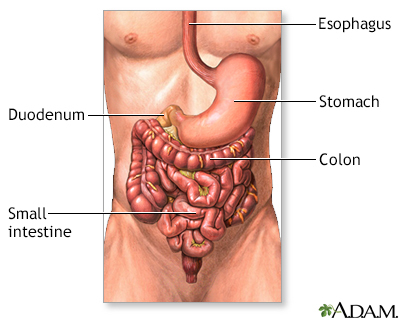Stools - foul smelling
Definition
Foul-smelling stools are stools with a very bad odor. They very often have to do with what you eat, but may be a sign of a medical condition.
Alternative Names
Foul-smelling stools; Malodorous stools
Considerations
Stools normally have an unpleasant odor. Most of the time, the odor is familiar. Stools that have an extremely bad, abnormal odor may be due to certain medical conditions. Foul-smelling stools also have normal causes, such as diet changes.
Causes
Causes may include:
- Celiac disease (also called celiac sprue)
- Crohn disease
- Chronic pancreatitis
- Cystic fibrosis
- Intestinal infection
- Malabsorption
- Short bowel syndrome
- Blood in stool from stomach or intestine
Home Care
Home care depends on what is causing the problem. Things you can do include:
- Follow your health care provider's instructions.
- If you have been given a special diet, stick to it closely.
- If you have diarrhea, drink more fluids so you do not get dehydrated.
When to Contact a Medical Professional
Contact your provider if you have:
- Black or pale stools often
- Blood in the stool
- Changes in the stool related to diet
- Chills
- Cramping
- Fever
- Pain in the abdomen
- Weight loss
What to Expect at Your Office Visit
Your provider will perform a physical exam and ask about your medical history. Questions may include:
- When did you first notice the change?
- Are the stools an abnormal color (such as pale or clay-colored stools)?
- Are the stools black (melena)?
- Are your stools hard to flush?
- What sort of diet have you eaten recently?
- Does a change in your diet make the smell worse or better?
- What other symptoms do you have?
The provider may take a stool sample. Other tests may be needed.
Gallery

References
Höegenauer C, Hammer HF. Maldigestion and malabsorption. In: Feldman M, Friedman LS, Brandt LJ, eds. Sleisenger and Fordtran's Gastrointestinal and Liver Disease. 11th ed. Philadelphia, PA: Elsevier; 2021:chap 104.
Nash TE, Hill DR. Giardiasis. In: Goldman L, Schafer AI, eds. Goldman-Cecil Medicine. 26th ed. Philadelphia, PA: Elsevier; 2020:chap 330.